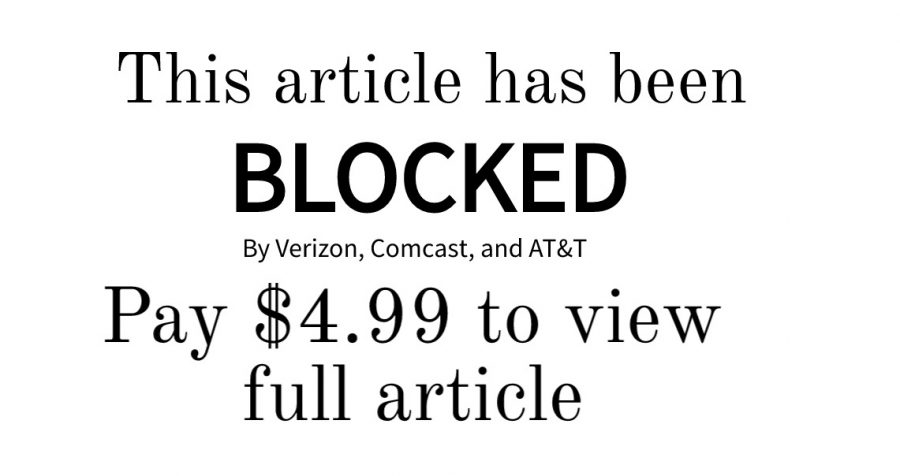Net Neutrality: Funds Over Freedom
January 3, 2018
The Federal Communications Commission voted on net neutrality to be repealed in a vote of 3:2 on December 14th. Chairman Ajit Pai of the FCC has succeeded in getting to highlight the end of net neutrality, a regulation where it treats all data the same and tells internet service provider (ISP) companies like Verizon, Comcast, and AT&T that they aren’t allowed to block or throttle websites. This allows bigger ISP companies to take more control over the internet, which may include charging consumers like you or anyone else for using the internet. By adding fast lanes of data to people who pay, ISP gives everyone else the slow lane, and blocks websites at ISP’s own will, as it may seem like the end of internet freedom.
Net neutrality and it’s heavy regulations aren’t gone already. The FCC now has to take the fight to Congress. It’s still not over yet, we still have an opportunity to stop the FCC and Chairman Pai by convincing the Congress to issue a resolution of disapproval against the FCC’s decision under the Congressional Review Act, which means to tell the FCC to cancel their plans of getting rid of net neutrality and its regulations.
While many have already heard about the huge debate of net neutrality, what does that term really means?
Net Neutrality is the principle that enforces the rules that treats all data on the internet the same and tells ISP companies aren’t allowed to control what websites you can access, implementing fast or slow lanes on the internet, and blocking or throttling (speeding up or slowing down internet service intentionally) any websites, it’s what allows the internet to have an open field for innovation, market, communication, and information while keeps ISP companies from committing any actions that would hurt their customers.
The FCC Chairman, Ajit Pai is pushing an aggressive campaign to permanently get rid of net neutrality and allow ISP companies to compete with bigger companies on the internet like Netflix, Amazon, etc. As a former Verizon lawyer, Chairman Pai is rolling back Net Neutrality to get back a job in Verizon which could explain why we’re currently going through this huge debate.
Having Net Neutrality rolled back will result in ISP companies continuing to practice anti-consumer methods such as selling parts of the internet into packages control what consumers can access, and making information and opinions becoming more scarce as you would be charged with monthly prices to use certain internet services such as Twitter or Instagram. Smaller business start-ups or entrepreneurs would have no chances of thriving under the full control of ISP companies monetizing or blocking websites which would go against one of Pai’s arguments claiming that a light regulation internet would allow other businesses to thrive and encourage competition according to the interview. (link) Having to roll back net neutrality is rolling back internet Freedom of Speech and would only result in benefiting a few ISP Companies while hurting the majority of people who uses the internet.
Aiden Kelly, a junior who’s extremely against Chairman Pai’s plans of rolling back net neutrality, said this, “Net neutrality is important because it keeps the internet as a resource for everyone to use, not just the wealthy or the people in charge. We all use it, whether for pleasure or for work.”
Another student, Matthew Mullen, who is not familiar with net neutrality said this:“Personally, I would not want companies to charge me for using the internet even if this speeds up some web sites the negatives still outweigh the positives.”
Even just before they planned on gutting net neutrality, ISP companies aren’t trustworthy around the rules either. According to the same interview used as the same before in this article, Chairman Pai has made a point in his argument that we can trust companies to not promote their stuff in the expense of others. However, that’s not entirely true. These ISP companies have a history of being caught throttling, blocking, and censoring websites. Here is a complication of ISP companies breaking net neutrality regulations ( link )
One last thing to know about the net neutrality debate is of the two sides of the argument. Obviously, one side is about supporting to keep net neutrality while the other side supports to repeal net neutrality, so who’s important and which side are they on? Starting with people who sides with Ajit Pai and the FCC, we have a few members of state representatives and Republicans such as Ted Cruz, ISP Companies such as Verizon, Comcast, and AT&T, and other individuals who wanted to end net neutrality for their own reasons.
As for people who sides with supporting net neutrality, we have big corporations and thousands of websites such as Facebook, Google, Netflix, etc, a couple of state representatives and democrats such as Mignon Clyburn, and millions of Americans or internet users which makes up over 80% of the people who supports net neutrality according to this. ( link )
It’s totally fine if you have a different opinion about this matter, as for those who does wanted to support Net Neutrality, the FCC purposefully ignored the millions of outcry from ordinary people during their debate on December 14 and voted on repealing Net Neutrality. The only one action we people can do is write and call Congress to pass a Resolution of Disapproval through here: (https://www.battleforthenet.com/)
As Representative Clyburn said during the FCC debate about Net Neutrality: “What saddens me is that the agency that is supposed to protect you is abandoning you, but what I am pleased to be able to say is the fight to save net neutrality does not end today. This agency does not have, the final word. Thank goodness.”


